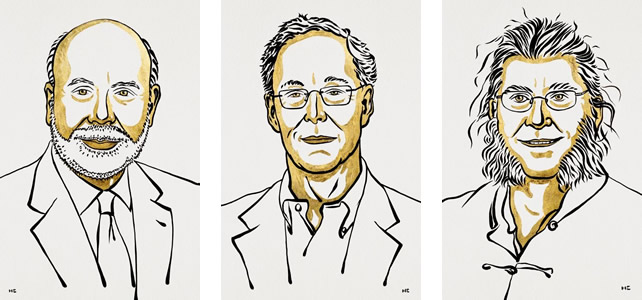« International fashion brand for young women, ONLY, introduces a new Anthem with its Brand Ambassador Ananya Panday. | Main | UGC India invites comments on Draft University Grants Commission (Conferment of Autonomous Status Upon Colleges and Measures for Maintenance of Standards in Autonomous Colleges) Regulations, 2022. »
October 10, 2022
The Royal Swedish Academy of Sciences awards the 2022 Nobel Prize in Economic Sciences to Ben S. Bernanke, Douglas W. Diamond, and Philip H. Dybvig “for research on banks and financial crises.”

Photo: 2022 Nobel Prize in Economic Sciences Winners: Ben S. Bernanke, Douglas W. Diamond, and Philip H. Dybvig.
10 October 2022
The Royal Swedish Academy of Sciences has decided to award the Sveriges Riksbank Prize in Economic Sciences in Memory of Alfred Nobel 2022 to
Ben S. Bernanke
The Brookings Institution, Washington DC, USADouglas W. Diamond
University of Chicago, IL, USAPhilip H. Dybvig
Washington University in St. Louis, MO, USA
“for research on banks and financial crises.”
Their discoveries improved how society deals with financial crises. This year’s laureates in the Economic Sciences, Ben Bernanke, Douglas Diamond, and Philip Dybvig, have significantly improved our understanding of the role of banks in the economy, particularly during financial crises. An important finding in their research is why avoiding bank collapses is vital.
Modern banking research clarifies why we have banks, how to make them less vulnerable to crises and how bank collapses exacerbate financial problems. Ben Bernanke, Douglas Diamond, and Philip Dybvig laid the foundation of this research in the early 1980s. Their analyses have been of great practical importance in regulating financial markets and dealing with financial crises.
For the economy to function, savings must be channeled to investments. However, there is a conflict here: savers want instant access to their money in case of unexpected outlays. On the other hand, businesses and homeowners need to know they will not be forced to repay their loans prematurely. In their theory, Diamond and Dybvig show how banks offer an optimal solution to this problem. By acting as intermediaries accepting deposits from many savers, banks can allow depositors to access their money when they wish while offering long-term loans to borrowers.
However, their analysis also showed how these two activities make banks vulnerable to rumors about their imminent collapse. If many savers simultaneously run to the bank to withdraw their money, the story may become a self-fulfilling prophecy - a bank run occurs, and the bank collapses. The government providing deposit insurance and acting as a lender of last resort to banks can prevent these dangerous dynamics.
Diamond demonstrated how banks perform another societally important function. As intermediaries between many savers and borrowers, banks are better suited to assessing borrowers’ creditworthiness and ensuring that loans are used for suitable investments.
Ben Bernanke analyzed the Great Depression of the 1930s, the worst economic crisis in modern history. Among other things, he showed how bank runs were a decisive factor in the situation becoming so deep and prolonged. When the banks collapsed, valuable information about borrowers was lost and could not be recreated quickly. Society’s ability to channel savings to productive investments was thus severely diminished.
“The laureates’ insights have improved our ability to avoid serious crises and expensive bailouts,” remarked Tore Ellingsen, Chair of the Committee for the Prize in Economic Sciences.
Sources: The Nobel Prize / The Royal Swedish Academy of Sciences
|GlobalGiants.Com|







Edited & Posted by the Editor | 8:22 AM | Link to this Post







